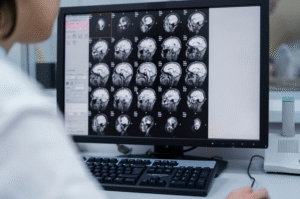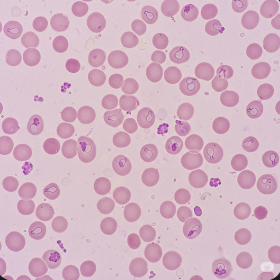Overview
Palpitations are the sensation of your heart beating unusually fast, irregularly, or forcefully, often felt in the chest, throat, or neck. While palpitations are usually harmless and short-lived, they can sometimes signal underlying heart conditions or other medical issues.
In Korea, specialized cardiology clinics and hospitals provide comprehensive evaluation, monitoring, and treatment for palpitations. Recognizing palpitations early and understanding their potential causes ensures effective management and reduces the risk of complications.
➤ Sensation of irregular, fast, or forceful heartbeat
➤ May occur with or without noticeable symptoms
➤ Prompt assessment is important if persistent or accompanied by other symptoms
Key Facts
➤ Palpitations can be occasional or frequent, depending on underlying triggers.
➤ Common triggers include stress, caffeine, medications, hormonal changes, or heart rhythm disorders.
➤ Symptoms can occur at rest or during activity.
➤ Palpitations may be benign (physiologic) or pathological, requiring investigation to determine cause.
➤ Korean cardiology centers offer ECG, Holter monitoring, and advanced cardiac imaging for accurate diagnosis.
What Are Palpitations?
Palpitations are subjective sensations of abnormal heartbeats that can feel like:
➤ Rapid or racing heartbeat
➤ Fluttering or skipped beats
➤ Forceful or pounding heartbeats
➤ Awareness of heartbeats in the chest, throat, or neck
Palpitations may be brief and harmless, often triggered by lifestyle factors, or they may persist and indicate arrhythmias, heart disease, or systemic disorders.
What Symptoms Are Related To
Palpitations may occur alone or alongside other symptoms, including:
➤ Chest discomfort or tightness
➤ Dizziness or lightheadedness
➤ Shortness of breath
➤ Sweating or anxiety
➤ Fainting (syncope) in severe cases
➤ Rapid or irregular pulse
➤ Palpitations during exertion or at night
These associated symptoms help distinguish benign palpitations from those requiring urgent medical attention.
What Causes / Possible Causes
Palpitations can result from cardiac, systemic, or lifestyle-related causes:
➤ Cardiac Causes
➤ Arrhythmias: Atrial fibrillation, atrial flutter, ventricular tachycardia, or premature beats.
➤ Structural heart disease: Cardiomyopathy, valve disorders, or heart failure.
➤ Myocardial ischemia or infarction: Reduced blood flow causing abnormal heartbeats.
➤ Systemic Causes
➤ Thyroid disorders: Hyperthyroidism increases heart rate.
➤ Anemia: Low hemoglobin can lead to compensatory rapid heartbeats.
➤ Electrolyte imbalances: Low potassium, magnesium, or calcium.
➤ Fever or infection: Increases metabolic demand on the heart.
➤ Lifestyle and Behavioral Factors
➤ Stress or anxiety causing heightened sympathetic activity.
➤ Caffeine, nicotine, or alcohol intake.
➤ Certain medications such as decongestants, stimulants, or asthma inhalers.
➤ Hormonal Changes
➤ Pregnancy or menopause may influence heart rate and rhythm.
➤ Hormonal therapy or thyroid medications can also contribute.
When Should I See My Doctor
Seek immediate medical attention if palpitations are accompanied by:
➤ Chest pain or pressure
➤ Shortness of breath or fainting
➤ Rapid or irregular heart rate lasting more than a few minutes
➤ Palpitations associated with dizziness or weakness
➤ History of heart disease, hypertension, or prior arrhythmias
Even if palpitations seem mild, persistent or recurrent episodes warrant cardiology evaluation to rule out serious causes.
Care and Treatment
Management depends on the underlying cause and severity:
➤ Lifestyle Modification
➤ Reduce caffeine, alcohol, and nicotine intake.
➤ Practice stress management techniques such as yoga, meditation, or deep breathing.
➤ Ensure adequate sleep and hydration.
➤ Medical Evaluation and Monitoring
➤ Electrocardiogram (ECG) for rhythm analysis.
➤ Holter monitoring for 24–48 hours to detect intermittent arrhythmias.
➤ Echocardiography to assess heart structure and function.
➤ Medication
➤ Beta-blockers or anti-arrhythmic drugs for certain heart rhythm disorders.
➤ Electrolyte correction or management of systemic conditions like hyperthyroidism.
➤ Interventional Procedures
➤ Cardiac ablation for specific arrhythmias.
➤ Pacemaker or ICD implantation in severe conduction disorders or life-threatening arrhythmias.
➤ Regular Follow-up
➤ Continuous monitoring and periodic check-ups ensure effective management and prevention of complications.
Treatment Options in Korea
Korea provides comprehensive cardiology care for palpitations with state-of-the-art diagnostic and treatment options:
➤ Top Hospitals and Cardiology Centers
➤ Asan Medical Center (Seoul): Advanced arrhythmia diagnosis and ablation therapy.
➤ Samsung Medical Center: Holter monitoring, ECG, and cardiac imaging.
➤ Seoul National University Hospital (SNUH): Multidisciplinary care for complex cardiac conditions.
➤ Yonsei Severance Hospital: Pacemaker and ICD implantation for life-threatening arrhythmias.
➤ Diagnostic Tools
➤ ECG and Holter monitors for rhythm assessment.
➤ Echocardiography for structural evaluation.
➤ Blood tests for thyroid, electrolytes, and cardiac biomarkers.
➤ Modern Interventions
➤ Anti-arrhythmic medications and beta-blockers.
➤ Catheter ablation for recurrent or dangerous arrhythmias.
➤ Lifestyle counseling for stress reduction and heart health maintenance.













